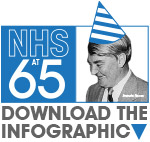The NHS at 65

On its 65th birthday, there is much for the NHS to celebrate. Its starring role in the Olympics opening ceremony last year seemed to sum up how the nation feels about it. It clearly occupies a special place in the heart of the British public; Ipsos data shows that almost half of the public say that the NHS is what makes them most proud to be British, higher than the Royal Family or the Armed Forces . Around seven in ten say that the NHS is one of the best health services in the world. And satisfaction with NHS services is high amongst those of us who have had cause to use them recently.
 However, this special birthday comes at a time when the NHS is under scrutiny and under pressure. The NHS portrayed in the media more recently is far removed from the treasured institution celebrated by Danny Boyle last summer. Instead, we have heard about poor standards, failing hospitals and missed A&E targets. And there are signs that this is starting to enter the public consciousness; almost one in four people says that most NHS hospitals have problems similar to those seen in Mid Staffordshire NHS Foundation Trust.
However, this special birthday comes at a time when the NHS is under scrutiny and under pressure. The NHS portrayed in the media more recently is far removed from the treasured institution celebrated by Danny Boyle last summer. Instead, we have heard about poor standards, failing hospitals and missed A&E targets. And there are signs that this is starting to enter the public consciousness; almost one in four people says that most NHS hospitals have problems similar to those seen in Mid Staffordshire NHS Foundation Trust.
So, perhaps this is an ideal time to reflect on the NHS and the service it provides. Can an institution set up in 1948 still provide the health service we need in 2013? The context and the challenges were very different then. When Aneurin Bevan embarked on “the biggest single experiment in social service”, there were around 43 million people in England and Wales; now there is 56 million. As a population, we are older and fatter too – now around one in four adults are obese and this level is predicted to double in the next 40 years. Medical advances mean that people are surviving illnesses that used to be fatal, but the financial burden on the NHS as a result is substantial.
This raises some very difficult questions for the NHS – and ones that the public too are struggling with. First and foremost is how to balance the books? The public recognise the challenge; they worry about the level of resources available, with over 80% thinking that the NHS will face a severe funding problem in the future. However, opinion is more divided as to whether there should be limits on what is spent on the NHS – six in ten think there should be, while four in ten do not. At a time of austerity, they are aware that it is one of the areas of greatest spend for the government, but the vast majority want it protected from cuts.
There are also questions about how the NHS provides services in the future. There is some recognition – and acceptance – that the NHS is changing the way it provides services to be able to keep up with the demands placed on it. While roughly equal numbers agree and disagree the NHS is changing, there is wider acceptance (in theory) that moving more services into the community is a good thing. Nevertheless, the prospect of closing or ‘downgrading’ the local hospital is still one that has the power to get the public marching on the streets. As an example, around 40,000 people are said to have marched recently to ‘save’ services at Stafford Hospital.
We are also starting to see early signs that the public recognise that our relationship with the NHS may have to shift in the future. If resources are squeezed, it is possible that the public will become less willing to see the NHS spending its money on people who choose unhealthy lifestyles. Already, two-thirds agree that it is the individual’s responsibility to look after their health, rather than the NHS. Around half go as far as to say that the NHS should be able to limit the treatment it offers for free to people who do not take responsibility for their health (just one in three disagrees) – of course, they might feel very different if they or their family were one of those people!
So, at 65 years old, the NHS is at something of a crossroads. We wait to see how this experiment in social service will develop over the coming years. And how will the public feel about the NHS at its next big birthday?



